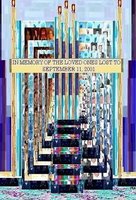Blog of the Day: ALMOST DIAMONDS
 When a writer captures my attention and holds it, I'm actually thrilled!
When a writer captures my attention and holds it, I'm actually thrilled!This blogger has a wonderful way with words and her format is pressed in a way as to not complicate some very 'complicated' subjects. Stephanie structures her sentences so that even I can understand what she is getting at. When I first saw the word 'SCIENCE' I thought "uh oh...I'm probably not going to understand a lot of her posts, but I'll give it a shot."
I was a terrible science student, my teachers couldn't get through to me because of my tendency to want to remain in the mysticism of the moment. To relish in the unexplainable. I wanted the mysteries of the universe to remain in my thoughts. Those were the thoughts and images I put on canvass with acrylic's and water color, in a sketch pad with charcoal or ink, doodling on a piece of scratch paper with a worn down pencil or writing randomly in the form of poetry in my journal.
"I" wanted to be wonderfully surprised every time there was a blooming flower in the snow of early Spring, a sidewalk full of night crawlers after a rain shower in the Summer and the ever growing noisy locusts when the humidity seemed to rise before Fall.
 My Science teachers sort of gave up on me because my questions were not very scientific and it frustrated them to no end. I refused to dissect anything put in front of me and received quite a few 'F's for my nonconformist ways. But not once did one of my teachers ask me to try think beyond my own little bubble of thought. Nor do I recall any teacher's encouraging me to seek out different aspects of Science. Nothing we did in class captivated my interest. And sometimes what we were expected to do repulsed me.
My Science teachers sort of gave up on me because my questions were not very scientific and it frustrated them to no end. I refused to dissect anything put in front of me and received quite a few 'F's for my nonconformist ways. But not once did one of my teachers ask me to try think beyond my own little bubble of thought. Nor do I recall any teacher's encouraging me to seek out different aspects of Science. Nothing we did in class captivated my interest. And sometimes what we were expected to do repulsed me.No field trips, no outside the box thinking, just strictly by the book. One teacher out of all - Mrs. Feldmann from my 1970's junior high school days , who was in her thirties with long hair parted on the side, probably the most progressive minded teacher (if I had only known that then), was the one teacher I regret not trying harder for. If she had come to us at a younger age, many of us would have probably done much better in all of our subjects. Learning and applying a different type discipline at that age would have been the foundation I probably would have benefited better by, even today.
But by then, the math issue had taken shape. The test phobia had hold. Being told by a math teacher 'you might as well just give up on math,' I couldn't hear Mrs. Feldmann the Science Teacher by the time she arrived to my school. I struggled with that math and test phobia all through school. To understand science you have to understand math. It saddens me that I was in such a foggy phobia at the time. And unfortunately I didn't realize until later in life that there was a whole world of science I wanted to explore. I wished I had explored.
 I don't have a scientific mind and can't seem to approach things in a scientific way because I have nothing to base it on. Two triumphs in my life are my son and daughter. Both are in their twenties and both are very smart about an array of subjects. I recognized that they needed a forceful advocate when each encountered difficulty in school with a certain teacher's attitude about what they were and were not capable of doing.
I don't have a scientific mind and can't seem to approach things in a scientific way because I have nothing to base it on. Two triumphs in my life are my son and daughter. Both are in their twenties and both are very smart about an array of subjects. I recognized that they needed a forceful advocate when each encountered difficulty in school with a certain teacher's attitude about what they were and were not capable of doing.I learned the subject at hand in order to translate the meaning to both at different intervals. Sometimes staying up all night to pour through their text book's, re-reading and doing the exercises in the book. Calling the teacher, going to chat with the teacher and often times my child would begin educating me after they got it. They excelled past me. The most satisfying point to it all.
It was the only thing of value I could give my children as their parent, other than a home, clothes on their back, a warm meal and Lot's of hugs and kisses. I gave them a piece of me and they did better and bigger with all of those pieces than I ever could have. They are so much smarter than I'll ever be.
So, that's what Stephanie's blog post's did for me. It got me to think. THANK YOU Stephanie!
 Stephanie at Almost Diamonds...
Stephanie at Almost Diamonds...Diversity Now October 15, 2008
"Setting aside the social justice issues as givens, I have two very selfish reasons for wanting the inside of science to look the same as the world outside."
"The problem with having a limited outlook is that we don’t--we can’t--know what it is that we don’t know. None of us can know who will ask different questions than we do, important questions. None of us can know how different the world looks from even a slightly different angle, what connections others can see that we can’t. We need this information."
 Young Science by October 25, 2008
Young Science by October 25, 2008"A History of Complexity" AND "The Forgotten History"
































2 Comments:
Wow. Thank you for all the kind words. I'm humbled.
I'm also very impressed with you teaching yourself so you could teach your children. It's amazing what the right motivation can do for us.
Your post's took me down memory lane and 'Inspired' this post. Your style of writing is a great gift. Thank you again. awakening
Post a Comment
<< Home